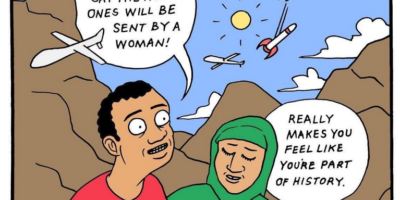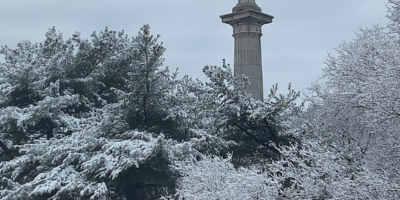By Barbara Goldman
On Wednesday, December 14, a FREE film opportunity will be available for any and all who wish to educate themselves about the past, present, and future of Appalachia. From 6:30-9:30 PM, Natasha’s Bistro & Bar (112 Esplanade) will host a critical fundraising event in support of the Appalachian Media Institute.
The AMI is a branch of Appalshop, the non-profit multidisciplinary arts and education center in the heart of Appalachia that produces original films, video, theater, music and spoken-word recordings, radio, photography, and multimedia. Since 1988, AMI has given central Appalachian youth the skills, technology, and resources to explore media production. The youth, in turn, create films concerning themselves and the communities from which they come.
According to one of the program’s educators, Natalie Baxter, students must first apply to be in the summer program before getting interviewed and, hopefully, hired. Only twelve students are selected each summer for the six-week program.
One of the many characteristics that makes this program unique is that it’s also a summer job for students. Students are paid interns who receive a paycheck for their involvement. Just like a job in the real world, there is a level of expectation to be met. Students can be, and have been, fired.
Baxter, a Lexington native currently at work on her Masters in Fine Arts at UK who became involved with the program through her family in Whitesburg, explains that students learn on day one how to use a camera, and that they continue to work on their filming and interviewing skills for three weeks. Over the last three weeks, students work in small groups on their final projects, a 10-12 minute film. Topic choices are typically associated with the young filmmakers or the community from which they come. Since 1988, no topic has been selected twice.
Several of these will be shown at the Natasha’s event on December 14.
One of this summer’s participants was Cory Coots, a sixteen-year-old from Hazard, Kentucky. Coots says that, had he not been accepted into the program, he would have spent the summer working at Food City.
“But I got this instead,” states Coots enthusiastically. “I applied and was accepted at first, but forgot to put my contact information on my application. But later they called me and interviewed me on the phone. They got my contact information from a friend who was in the program. Somebody didn’t show up, so I got it. “
Coots says that it wasn’t easy at first. He loved the program but was having transportation issues. However, the program offers a solution for any obstacle with which they can help. A friend of the program offers a house where the kids can live for the six weeks. Miss Pam, the house “mom,” cooks, supervises, and supports the youth involved.
“I was surprised the most by the friendliness of the people,” says Coots. “Everyone greeted me with a warm heart. It made it a lot easier to learn new skills.”
Coots, who got his start in filmmaking by producing YouTube videos of his grandmother, chose her as the subject of his film. But selecting a topic wasn’t so easy.
“I learned there’s a lot of stories out there untold. And people need to hear them,” says Coots. “We really worked with each other. We criticized each other’s films even though we’re friends. We just wanted each other to do the best we could.”
Baxter says that, not only does this program create unique films, it also helps open opportunities to youth that they may not have known they had. Most of the participants come from families who have never dreamed of going to college. This program hands and helps kids fill out college applications.
“I really want to go to a university and study genetic counseling,” says Coots. “AMI has really changed my perspective on life. I could still even see myself going into film and media production. There are lots of opportunities AMI has shown me that I wouldn’t have had working at Food City.”
Students’ films cover a varied array of topics including homosexuality in the mountains, youth who are raised by their grandparents when parents disappear due to drug problems, Appalachian music, solar solutions donated after gross electric bills, success stories, and unique pieces of history.
“People open up to them more because they are from that region,” says Baxter.
In the past the media has both aided and assaulted the stories of Appalachians, but this program literally puts the camera in their hands and tells stories through their eyes. Appalachian youth are given the opportunity to offer their fellow communities hope. There is enough poverty in the world for everyone to have a full load. But there is also enough prosperity in the world for everyone to have a full load.
Hope is the companion of power and the mother of success. Many things motivate people: money, cars, drugs, power, and recognition, to name a few. Yet all these pale in significance compared to the motivating power of hope. Without hope people drift into despair and apathy. What motivates people? Hope. What motivates change? Hope.
“We want to get the word out there and show people what we’re all about and also make some money for our interns,” says Baxter.
In a season where we could all use more hope, you are invited to Natasha’s Bistro & Bar to witness films that are fantastically unusual and beautiful for FREE. Pledges and support are what will allow this project to continue. Reservations are recommended, but if you are unable to attend please contact Appalshop for more information about how to make a donation (Natasha@appalshop.org).
Films may be viewed at the UK Appalachian Center or found at www.appalshop.org. To make reservations for the fundraiser, please call Natasha’s Bistro & Bar at (859)259-2764. For more information, or to access the Facebook invitation, you can go to www.facebook.com/appalachianmedia.



Leave a Reply